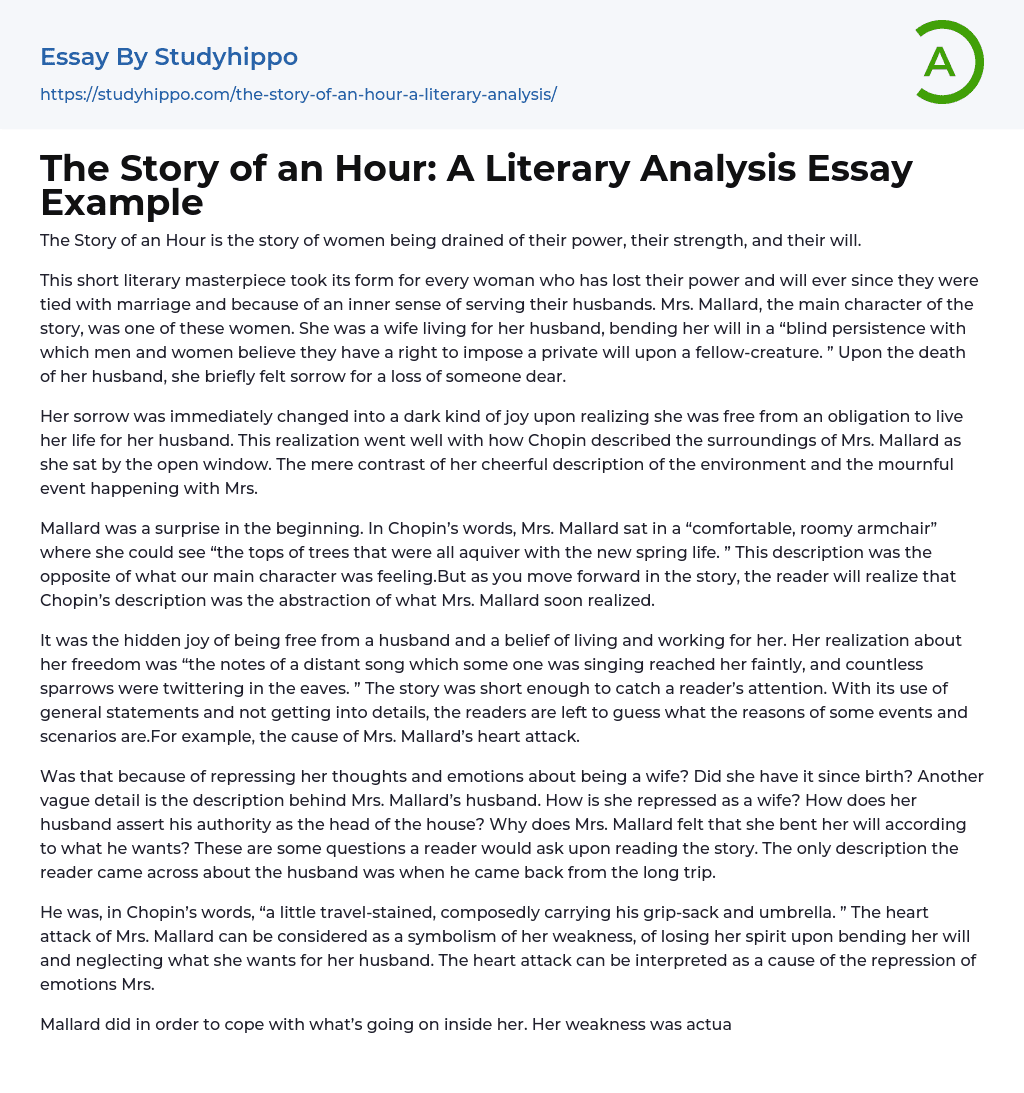Women's strength, courage, and ability to make decisions deteriorate throughout The Story of an Hour.
The following literary piece is a tribute to women who have lost their power and freedom as a result of marriage and the feeling of obligation to cater to their husbands. Mrs. Mallard, the protagonist in this story, falls into this category. She has spent her life serving her husband and conforming to societal norms that permit both men and women alike to dictate private desires onto others. When her husband passes away, she briefly mourns his death.
As she sat by the open window, Mrs. Mallard experienced a shift in emotions. She transformed from feeling sorrow to a dark form of joy when she realized she was no longer obligated to live her life for her husband. Chopin's depiction of Mrs. Mallard's surroundings perfectly complemented t
...his realization. The contrast between the joyful description of the environment and the sorrowful event occurring with Mrs. Mallard was noticeable.
Initially, Mrs. Mallard's situation was unexpected. She sat in a spacious armchair that provided a view of the vibrant trees that symbolized new life in the spring, as per Chopin's writing. This depiction contrasted with her emotional state. However, as the narrative progresses, readers understand that this portrayal by Chopin was a representation of Mrs. Mallard's eventual realization.
The faint singing of a distant song and the countless sparrow tweets in the eaves brought Mrs. Mallard a hidden joy of being free from her husband and the belief that she was living and working for herself. The short story with its use of general statements leaves the readers to speculate the reasons behind som
events and scenarios, such as the cause of Mrs. Mallard's heart attack, making it intriguing enough to catch their attention.
Upon reading the story, questions arise about Mrs. Mallard's repressed thoughts and emotions regarding her role as a wife and whether this repression was innate. Additionally, the details about Mrs. Mallard's husband and how he exerts his authority as the head of the household are vague. The reader may wonder how Mrs. Mallard is repressed as a wife and why she feels compelled to bend to her husband's will. The husband is only described upon his return from a long trip.
According to Chopin, the man appeared travel-worn and calm as he carried his luggage and umbrella. Mrs. Mallard's heart attack symbolizes her vulnerability and loss of strength from suppressing her desires and sacrificing for her husband. This incident can be seen as a manifestation of repressed emotions within Mrs. Mallard.
Mrs. Mallard utilized her weakness to manage her inner turmoil, which played a crucial role in the story, defining her as a spouse devoid of independence.
After her heart attack, Mrs. Mallard's frailty led readers to envision a scenario wherein she was confined to a home, unable to act autonomously and perpetually catering to her husband’s whims. This role, traditionally considered appropriate for a wife, birthed a covert persona within her, one that yearned for liberation. Though she experienced exhilaration at the prospect of newfound freedom—that too despite the loss of her spouse—ultimately, her intense longing for autonomy proved to be her undoing.
Kate Chopin's short story conveyed a feminist theme by challenging the misguided notion that wives must submit to their husbands. Mrs. Mallard's death is
warranted, as she discovers happiness in newfound freedom and no longer is bound to her husband. The story highlights the detrimental effects of this belief, which diminish women's autonomy, causing them to sacrifice their individuality and bend to their husband's will.
Although women can lead a domestic lifestyle, they should not be restricted to living in the shadow of a man. Kate Chopin conveyed a message that women, even as wives, should prioritize their own desires and aspirations.
- Pressure essays
- Confidence essays
- Disgrace essays
- Lost essays
- Harmony essays
- Fairness essays
- Sarcasm essays
- Respect essays
- Responsibility essays
- Empathy essays
- Suffering essays
- Suspense essays
- Fear essays
- Feeling essays
- Loneliness essays
- Ambition essays
- Tolerance essays
- Hope essays
- Inspiration essays
- Kindness essays
- Shame essays
- Desire essays
- Doubt essays
- Grief essays
- Hate essays
- Laughter essays
- Passion essays
- Pride essays
- Forgiveness essays
- Happiness essays
- Humanity essays
- Loyalty essays
- Guilt essays
- Honesty essays
- Betrayal essays
- Need essays
- Boredom essays
- Courage essays
- Regret essays
- Anger essays
- Honor essays
- Honesty Is The Best Policy essays
- Desiree's Baby essays
- John Locke essays
- 9/11 essays
- A Good Teacher essays
- A Healthy Diet essays
- A Modest Proposal essays
- A&P essays
- Academic Achievement essays




